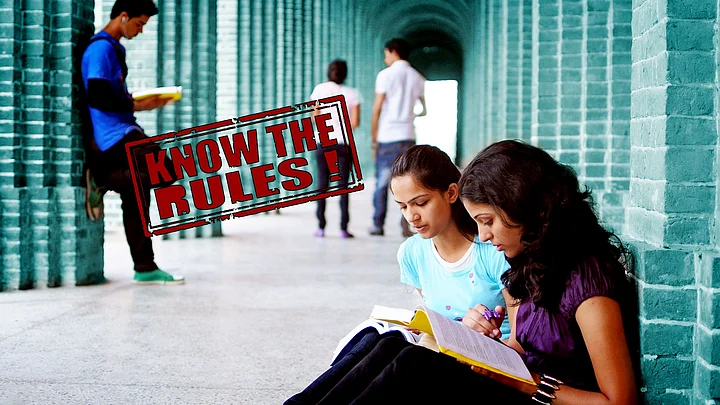Strict dress codes, unreasonable fines and no freedom to complain or raise one’s voices against anomalies. Students of the Christ University in Bengaluru have been actively writing about and protesting these restrictions for more than a week now.
It all started with a faculty member being fired by the college management for supporting students, and an anonymous blog post highlighting a case of sexual harassment – things nobody ever thought could be associated with an ‘outstanding’ and ‘prestigious’ university.
Christ University, however, is not the only educational institution to have made headlines for weird dress codes, bizarre rules and harassment by the management. It is something that ails almost every educational institution across south India.
Unlike their relatively liberal, politically charged and relatively gender-inclusive counterparts in the North, colleges in Kerala, Tamil Nadu, Andhra Pradesh or Karnataka have been termed ‘gender prisons’, ‘hubs of medieval mindsets’ and ‘educational jails’ from time to time.
With bans on growing beards, rolling up shirt sleeves, lycra leggings, shorts and jeans, mandating ‘v-shaped dupatta’ pinned on both sides, or separate staircases for men and women, the colleges down south ensure ‘discipline’ – sometimes at the cost of logic and sanity.
23-year-old Rameez Nandi and 19-year-old Neeraja Anil would be happily married under the Special Marriage Act if Neeraja’s college did not think that an inter-religious marriage was uncalled for. FGM Women’s College, Kozhikode barred Neeraja from attending classes in the name of ‘indiscipline’.
When we went to meet the Principal, the vice-principal simply wouldn’t allow us to meet her. She told me girls who indulged in inter-religious marriages are not permitted in the college and that the Principal is not at all interested in meeting such girls.Neeraja in an interview to TNM
Known for their remarkable infrastructure and quality of education, the institutes in south India also take pride in becoming the custodians of traditions, social mores and religious beliefs.
Cell phones, laptops and electronic equipments are mostly not allowed on campuses, and if they are, students could be instructed to have only ‘non-romantic ringtones’. The aim of the management is apparently not to harass students but to curb “romantic feelings.” So much so that at a few colleges, “trees have been cut off”, say students, “to make sure boys and girls do not gather under them”.
If you happen to stay in a hostel, chances are your father may be considered your boyfriend, so he must be ready with proof that the one staying in hostel is his daughter. Interaction between girls and boys is strictly prohibited. Explaining your innocence in any of the above violations shows you are arrogant and hence you will be asked to attend personality improvement classes.Tinu Babychan, ex-student, Vimala college, Thrissur, Kerala
While nothing ever came out of Christ Church University as students feared for their marks and grades (and rebelling professors were sacked), a few colleges in Kerala have been dragged to court for their unjust and crippling rules.
The news from Christ University does not surprise us at all. We have studied in colleges in Kerala which are far more gender insensitive. A girl from an engineering college was dismissed for falling in love with her classmate. Girls and boys are punished for sitting on the same bench. In 2015 we started a campaign called Break the Curfew against arbitrary hostel timings, that forced the authorities to make some changes. The problem is that even courts and authorities rule in the favour of moral policing.Aishwarya, Ex-student CET, Trivandrum
Jeppiaar, a politician-turned-educationist, is known as the man behind the strictest colleges in Tamil Nadu. He introduced the system of no interaction between the two sexes in the state’s engineering colleges.
On condition of anonymity, a final year student of Jeppiaar-led Sathyabama University in Chennai says:
I passed out of the college in 2004. Separate staircases for men and women were a norm those days. In buses we used to have a rope behind the first four seats, where girls sat, and boys could not cross the rope. Talking to girls reflected on your character, which in turn meant low grades in assignments. There was designated staff to keep a check on these things.
Ironically, as the students protest the nerve-wracking discipline, it is usually a big draw for parents.
Parents in India have a huge say in education and career decisions even at the university level. In case of girls, parents can go out of bounds to ensure their safety and security. As a result most parents appreciate the college authorities for functioning as stand-in parents.A current student of Christ University
Armed with social media and anonymous blogging, students at these colleges and universities are now capable of sharing their stories. But as students and parents throng these colleges year after year in the admission race, both the colleges and the parents need to recognise the fine line between ensuring discipline and being draconian.
(At The Quint, we question everything. Play an active role in shaping our journalism by becoming a member today.)
